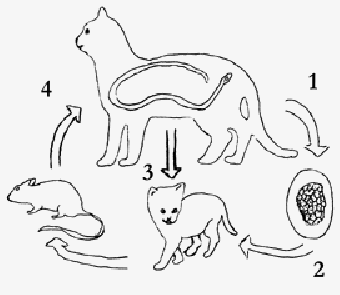If one pet has worms do I have to treat them all?
If you find one pet has worms, others may as well. That is because they share the same environment and therefore the same risk factors. Some worms are more likely to be shared than others.
Roundworms- contagious through dam to offspring (in utero or lactation), fecal contact or intermediate host (like a mouse)
Whipworms- contagious through fecal contact and soil inoculation
Hookworms- contagious though fecal contact, soil inoculation and contact of skin with inoculated soil
Tapeworms- contagious through shared prey sources (small rodents, rabbits), shared flea populations, or under-cooked meat sources
In the case of Tapeworms, if one cat is indoors and non-hunting and the other is outdoors and a known hunter, the indoor cat is unlikely to need treatment because they are not sharing the same risk factors.
Other sources of less common parasites include eating beetles, cockroaches, snakes, frogs/toads, uncooked fish, snails/slugs, crustaceans (lobster, crawdads), uncooked game (moose, rabbit, etc), or impure water sources.
It is always safest to test all household pet members for parasites (fecal or stool sample) OR treat all household pet members as if they are infected. Treatment may be in the form of liquid, pill, powder or topical medication. Medication choices usually involve considerations of cost, convenience and chance of getting the medication in the pet, as well as size and age of the pet, so actual medication used may vary from pet to pet. You may approach the reception staff or veterinarian for instructions specific to your household and environment.
Back to FAQs


